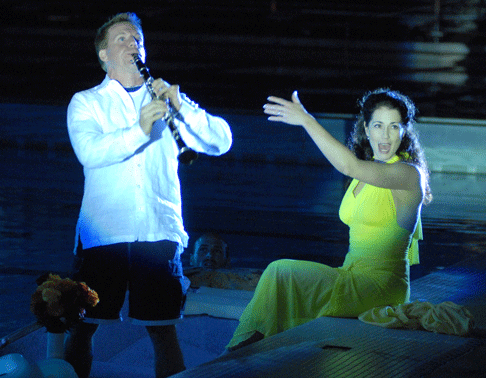19 Jun 2010
Orpheus & Euridice at Long Beach Opera
Early Greek writings say that Orpheus was the son of the muse Calliope and either Apollo, the god of prophecy and music or Oeagrus, the river god.

Early Greek writings say that Orpheus was the son of the muse Calliope and either Apollo, the god of prophecy and music or Oeagrus, the river god.
References to Orpheus survive from as far back as the sixth century BCE. Pindar called him the ‘father of song’. It was thought that his mother taught him to sing while Apollo instructed him on the lyre.To the Greeks of the classical age, Orpheus was venerated as animportant artist whose music could charm birds, fish and even wild creatures into docility. According to legend, he could change the course of rivers, make the rocks dance and make the gods of the underworld do his bidding. Both Pindar and Apollonius of Rhodes say that he sailed with Jason and the Argonauts. When Orpheus heard the sirens’ voices attempting to lure the ship off course, he played his incredibly beautifulmusic and drowned out the evil witches’ songs.
It was Virgil who told the tale with which we are most familiar. According to him, Orpheus married Euridice who was soon bitten by a snake anddied. He was terribly distraught and sang songs so touching that the nymphs and the gods wept with him. Thus, Euridice was allowed to return to earth provided that Orpheus did not look at her on the journey. As soon as he reached the upper world, however, he turned to her, not realizing that because she was following a few steps behind him, she was not yet on earth. As a result, he lost her forever.
Virgil’s story is the model for Ricky Ian Gordon’s poem, Orpheus & Euridice. As with some nineteenth century writers, Gordon has written both the poem and the music for this opera, which can also be presented as a song cycle, since only one character actually sings. Euridice is both the bride who dies and the narrator, while Orpheus is a clarinetist. As Gordon put it:
‘In books it was a lute
but in my dream
it was a reed not a flute,
something richer, darker, starker...’
To play the part of the musician who could charm the inhabitants of earth, Mount Olympus and the underworld is, of course, a tall order, but clarinetist Todd Palmer was a perfect choice. It was easy to imagine hisexpressive, plangent tones allowing him to bargain with the gods of the nether world.
On Friday 11 June 2010, Long Beach Opera presented Gordon’s Orpheus & Euridice at the Belmont Plaza Olympic Pool in Long Beach,California. The pool is indoors and is set up with bleacher seating that allows spectators to watch swimming meets. It’s a rather unusual venue for opera, but Long Beach Opera is famous for performing in thought-provoking places. Here the huge pool was the River Styx, which Orpheus has to cross and recross in order to retrieve his beloved Euridice from the underworld. To paraphrase Anna Russell’s Ringanalysis, the scene opens in the river, in it. While soprano Elizabeth Futral who sang Eurydice and Todd Palmer as Orpheus only received an occasional splash, supers and dancers were engulfed by the chilling waters of the Styx for much of the performance.
 Todd Palmer as Orpheus and Elizabeth Futral as Euridice [Photo courtesy of Long Beach Opera]
Todd Palmer as Orpheus and Elizabeth Futral as Euridice [Photo courtesy of Long Beach Opera]
Clothed in a tasteful short yellow gown and matching wrap by Emmy-nominated designer Marcy Froelich, Futral was a vision of physical loveliness who sang with equal vocal beauty. At this watery venue, there could have been all sorts of echoes, so the performers had to wear microphones, but the sound design was well done by Bob Christian and Futral’s lustrous silver tones sounded much as they had in the acoustic confines of San Diego Opera. She had a most appealing stage presence while singing her lines with the utmost clarity and conviction. Stage director Andreas Mitisek is LBO’s general and artistic director as well. With capable artists, a minimum of scenery by set designer Alan Muraoka and most inventive lighting design by Dan Weingarten, the pool became the mythical river of the ancient Greek legend.
Palmer had actually commissioned the piece in 1995. He wanted a short work similar to Franz Schubert’s Der Hirt auf dem Felsen, and Gordon agreed to write it despite caring for a seriously ill partner at that time. The composer procrastinated for quite a while until one evening when he dreamed of Orpheus. That same night he wrote the poem and sometime later the music followed. The final work was, however, a great deal longer than expected and had many more ramifications than a simple song cycle for soprano, clarinet and piano. On Friday night, we were treated to the addition of a mellifluous string orchestra as well as the fine piano virtuosity of Melvin Chen. Conductor Stephen White led the ensemble in this dramatically alert, romantic performance and drew sterling contributions from all.
This was a most interesting experiment and it turned out to be a major success. The applause at the end was thunderous, especially when the composer took his bow. He has a show heading for Broadway and commission from the Metropolitan Opera, so we were very lucky to hear his work in such an intimate venue.
Maria Nockin